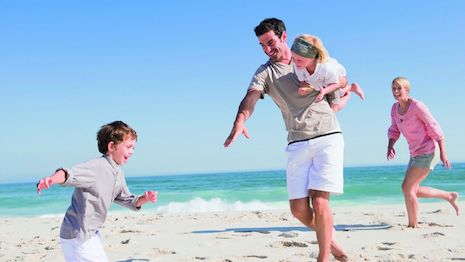 Family travel is a growing segment. Image credit: Ritz-Carlton
Family travel is a growing segment. Image credit: Ritz-Carlton
NEW YORK – Millennial consumers with children are a significant $39.2 billion portion of the travel market, and they plan to up their vacation spending by 12 percent in the coming year.
During a keynote presentation at The New York Times Travel Show on Jan. 25, an executive from MMGY explained that millennials are the only generation expected to up their travel spending this year, and about half of the age group now has families of their own. About a third of all vacations taken in the last year included children, and minors are having a heavy influence on family travel plans, making both parents and their progeny a target for travel marketing.
"Often times we fail to realize the effect that kids have on our vacation planning," said Steve Cohen, senior vice president of travel insights at MMGY Global.
"Gone are the days, like when I was little, when my parents would put me in the car to go on vacation and sometimes I didn’t even know where we were going," he said. "If you’re not advertising to kids to get them to make that decision, you’re missing out on an opportunity."
MMGY’s research is based on a survey of consumers with a household income of at least $50,000.
Millennial moms and dads
The forecast for 2019 expects that the number of trips taken will fall by 3 percent. Meanwhile, spending is projected to stay the same, meaning that consumers will be spending more per trip.
While baby boomers hold more wealth and are still spending the most on travel, it is the millennials who are actually growing their spend. Gen Xers spend more than millennials, but they are reducing what they spend on vacations.
Mr. Cohen pointed out that contrary to the image of millennials as straight of college with limited incomes, this age group has matured and their interests are different than what travel marketers may expect.
With millennials ranging in age from about 19 to 39, marketing campaigns targeting the generation as a whole are unlikely to succeed. Instead, pinpointing specific groups of millennials is more apt to resonate.
Half of millennials are married with children. An additional quarter are married, and the remaining 25 percent are single.
Those who have children are planning to up their spend on travel, while single and married millennials are projected to reduce travel expenditures.
 Family-friendly travel is a key part of the market. Image credit: Peninsula
Children now play a significant role in planning vacations. Twenty-seven percent of parents say that they are at their kids’ mercy for deciding where to go, and 53 percent pick destinations that are kid-friendly.
Families also tend to plan ahead. Three-quarters know what attractions they are seeing before they leave.
One of the resources that consumers turn to for research is social media, which is particularly important at reaching the millennial audience. While it is still not common to follow travel brands or destinations directly, consumers do search hashtags to find inspiration.
Consumers also say their friends’ posts influence their trips. Hotels and other brands can use a hashtag strategy to draw attention to themselves on Instagram or Twitter.
Social media has become a key source of inspiration for consumers as they make travel plans, but a report found that friends’ posts are more influential than what a brand or publication shares.
According to a survey from Allianz Global Assistance, about half of millennials say social media influences their travel decisions. Peer-to-peer word of mouth holds the most sway, as 86 percent of consumers trust their own social networks to post accurate content about travel experiences, while 55 percent deem brands to be truthful on social media (see story).
Travel trends
Fifty-six percent of consumers have taken a flight in the last year, and this is set to grow to 65 percent in the next 12 months.
The U.S. destination with the most interest are the Hawaiian Neighbor Islands, with 64 percent of travelers saying they would like to go there. Other top destinations are the Florida Keys, New York and Washington, D.C.
Family-friendly travel is a key part of the market. Image credit: Peninsula
Children now play a significant role in planning vacations. Twenty-seven percent of parents say that they are at their kids’ mercy for deciding where to go, and 53 percent pick destinations that are kid-friendly.
Families also tend to plan ahead. Three-quarters know what attractions they are seeing before they leave.
One of the resources that consumers turn to for research is social media, which is particularly important at reaching the millennial audience. While it is still not common to follow travel brands or destinations directly, consumers do search hashtags to find inspiration.
Consumers also say their friends’ posts influence their trips. Hotels and other brands can use a hashtag strategy to draw attention to themselves on Instagram or Twitter.
Social media has become a key source of inspiration for consumers as they make travel plans, but a report found that friends’ posts are more influential than what a brand or publication shares.
According to a survey from Allianz Global Assistance, about half of millennials say social media influences their travel decisions. Peer-to-peer word of mouth holds the most sway, as 86 percent of consumers trust their own social networks to post accurate content about travel experiences, while 55 percent deem brands to be truthful on social media (see story).
Travel trends
Fifty-six percent of consumers have taken a flight in the last year, and this is set to grow to 65 percent in the next 12 months.
The U.S. destination with the most interest are the Hawaiian Neighbor Islands, with 64 percent of travelers saying they would like to go there. Other top destinations are the Florida Keys, New York and Washington, D.C.
 Four Seasons Resort, Maui, HI. Image credit: Four Seasons
Outside of the U.S., London tops the list for travel interest, followed by Paris, Rome and Venice. All but one of the top 10 destinations by interest are in Europe.
While this interest does not mean that consumers actually ventured to Hawaii or London, marketers can use this to highlight the appeal of similar locales.
One of the decision drivers for travel is food. The local culinary scene in New Orleans has helped the city become the destination with the greatest interest lift in the last five years.
While consumers know where they want to travel, who they want to travel with is another story. Only 29 percent say they have loyalty to a hotel brand.
Loyalty rates are even worse for rental car companies. Mr. Cohen said that the rental market is poised for a disruptor, such as Audi’s Silvercar, to break up the commoditization of the category.
Despite the rise of the sharing economy and alternative accommodations, traditional hotels remain the primary choice for travelers, with 72 percent staying at a hotel last year compared to just 20 percent that used shared accommodations.
Home-sharing service Airbnb has announced a number of new services to attract wealthy travelers to luxury homes and hotels.
After years of hotels unofficially offering their rooms through Airbnb, the service is now allowing for more specialized searches for customers looking specifically for hotels rather than a room in someone’s home. Additionally, a service called Airbnb Plus will connect affluent travelers with luxury accommodations, blurring the line between Airbnb and other high-end, luxury hotel services (see story).
While the travel industry grows, sharing a greater portion of the market with the likes of Airbnb has not been too painful. However, with spending starting to contract, hoteliers are expected to start seeing the effects.
"Travel came out of the recession before the U.S. economy did," Mr. Cohen said. "The primary reason is the perception of affordability of travel.
"Affordability of travel is so high right now, and that’s why we see more people saying they’re going to stay in hotels, more people saying that [they're] likely to fly," he said. "The challenge is that people are concerned about their amount of discretionary income. Is there a recession on the horizon? Do I want to not spend as much on travel?
"So we see the fact that people’s perceptions and why travel tends to be in a positive place right now is because they feel like it’s inexpensive."
Four Seasons Resort, Maui, HI. Image credit: Four Seasons
Outside of the U.S., London tops the list for travel interest, followed by Paris, Rome and Venice. All but one of the top 10 destinations by interest are in Europe.
While this interest does not mean that consumers actually ventured to Hawaii or London, marketers can use this to highlight the appeal of similar locales.
One of the decision drivers for travel is food. The local culinary scene in New Orleans has helped the city become the destination with the greatest interest lift in the last five years.
While consumers know where they want to travel, who they want to travel with is another story. Only 29 percent say they have loyalty to a hotel brand.
Loyalty rates are even worse for rental car companies. Mr. Cohen said that the rental market is poised for a disruptor, such as Audi’s Silvercar, to break up the commoditization of the category.
Despite the rise of the sharing economy and alternative accommodations, traditional hotels remain the primary choice for travelers, with 72 percent staying at a hotel last year compared to just 20 percent that used shared accommodations.
Home-sharing service Airbnb has announced a number of new services to attract wealthy travelers to luxury homes and hotels.
After years of hotels unofficially offering their rooms through Airbnb, the service is now allowing for more specialized searches for customers looking specifically for hotels rather than a room in someone’s home. Additionally, a service called Airbnb Plus will connect affluent travelers with luxury accommodations, blurring the line between Airbnb and other high-end, luxury hotel services (see story).
While the travel industry grows, sharing a greater portion of the market with the likes of Airbnb has not been too painful. However, with spending starting to contract, hoteliers are expected to start seeing the effects.
"Travel came out of the recession before the U.S. economy did," Mr. Cohen said. "The primary reason is the perception of affordability of travel.
"Affordability of travel is so high right now, and that’s why we see more people saying they’re going to stay in hotels, more people saying that [they're] likely to fly," he said. "The challenge is that people are concerned about their amount of discretionary income. Is there a recession on the horizon? Do I want to not spend as much on travel?
"So we see the fact that people’s perceptions and why travel tends to be in a positive place right now is because they feel like it’s inexpensive."
